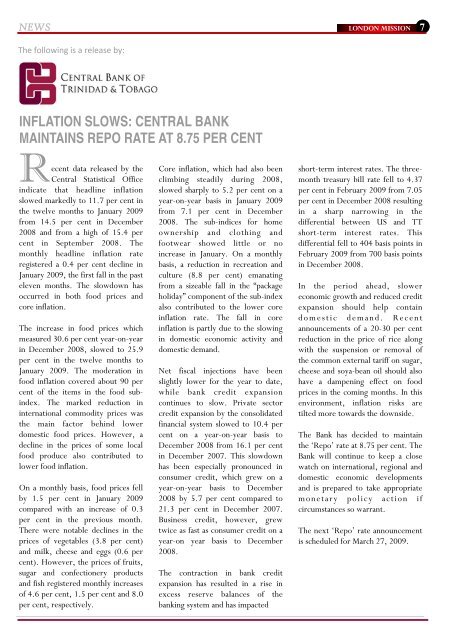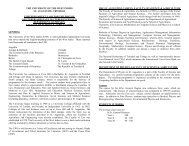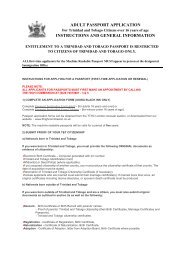Volume 41, February 5 - March 5, 2009 - High Commission for the ...
Volume 41, February 5 - March 5, 2009 - High Commission for the ...
Volume 41, February 5 - March 5, 2009 - High Commission for the ...
Create successful ePaper yourself
Turn your PDF publications into a flip-book with our unique Google optimized e-Paper software.
NEWS<br />
LONDON MISSION 7<br />
The following is a release by:<br />
INFLATION SLOWS: CENTRAL BANK<br />
MAINTAINS REPO RATE AT 8.75 PER CENT<br />
R<br />
ecent data released by <strong>the</strong><br />
Central Statistical Office<br />
indicate that headline inflation<br />
slowed markedly to 11.7 per cent in<br />
<strong>the</strong> twelve months to January <strong>2009</strong><br />
from 14.5 per cent in December<br />
2008 and from a high of 15.4 per<br />
cent in September 2008. The<br />
monthly headline inflation rate<br />
registered a 0.4 per cent decline in<br />
January <strong>2009</strong>, <strong>the</strong> first fall in <strong>the</strong> past<br />
eleven months. The slowdown has<br />
occurred in both food prices and<br />
core inflation.<br />
The increase in food prices which<br />
measured 30.6 per cent year-on-year<br />
in December 2008, slowed to 25.9<br />
per cent in <strong>the</strong> twelve months to<br />
January <strong>2009</strong>. The moderation in<br />
food inflation covered about 90 per<br />
cent of <strong>the</strong> items in <strong>the</strong> food subindex.<br />
The marked reduction in<br />
international commodity prices was<br />
<strong>the</strong> main factor behind lower<br />
domestic food prices. However, a<br />
decline in <strong>the</strong> prices of some local<br />
food produce also contributed to<br />
lower food inflation.<br />
On a monthly basis, food prices fell<br />
by 1.5 per cent in January <strong>2009</strong><br />
compared with an increase of 0.3<br />
per cent in <strong>the</strong> previous month.<br />
There were notable declines in <strong>the</strong><br />
prices of vegetables (3.8 per cent)<br />
and milk, cheese and eggs (0.6 per<br />
cent). However, <strong>the</strong> prices of fruits,<br />
sugar and confectionery products<br />
and fish registered monthly increases<br />
of 4.6 per cent, 1.5 per cent and 8.0<br />
per cent, respectively.<br />
Core inflation, which had also been<br />
climbing steadily during 2008,<br />
slowed sharply to 5.2 per cent on a<br />
year-on-year basis in January <strong>2009</strong><br />
from 7.1 per cent in December<br />
2008. The sub-indices <strong>for</strong> home<br />
ownership and clothing and<br />
footwear showed little or no<br />
increase in January. On a monthly<br />
basis, a reduction in recreation and<br />
culture (8.8 per cent) emanating<br />
from a sizeable fall in <strong>the</strong> “package<br />
holiday” component of <strong>the</strong> sub-index<br />
also contributed to <strong>the</strong> lower core<br />
inflation rate. The fall in core<br />
inflation is partly due to <strong>the</strong> slowing<br />
in domestic economic activity and<br />
domestic demand.<br />
Net fiscal injections have been<br />
slightly lower <strong>for</strong> <strong>the</strong> year to date,<br />
while bank credit expansion<br />
continues to slow. Private sector<br />
credit expansion by <strong>the</strong> consolidated<br />
financial system slowed to 10.4 per<br />
cent on a year-on-year basis to<br />
December 2008 from 16.1 per cent<br />
in December 2007. This slowdown<br />
has been especially pronounced in<br />
consumer credit, which grew on a<br />
year-on-year basis to December<br />
2008 by 5.7 per cent compared to<br />
21.3 per cent in December 2007.<br />
Business credit, however, grew<br />
twice as fast as consumer credit on a<br />
year-on year basis to December<br />
2008.<br />
The contraction in bank credit<br />
expansion has resulted in a rise in<br />
excess reserve balances of <strong>the</strong><br />
banking system and has impacted<br />
short-term interest rates. The threemonth<br />
treasury bill rate fell to 4.37<br />
per cent in <strong>February</strong> <strong>2009</strong> from 7.05<br />
per cent in December 2008 resulting<br />
in a sharp narrowing in <strong>the</strong><br />
differential between US and TT<br />
short-term interest rates. This<br />
differential fell to 404 basis points in<br />
<strong>February</strong> <strong>2009</strong> from 700 basis points<br />
in December 2008.<br />
In <strong>the</strong> period ahead, slower<br />
economic growth and reduced credit<br />
expansion should help contain<br />
domestic demand. Recent<br />
announcements of a 20-30 per cent<br />
reduction in <strong>the</strong> price of rice along<br />
with <strong>the</strong> suspension or removal of<br />
<strong>the</strong> common external tariff on sugar,<br />
cheese and soya-bean oil should also<br />
have a dampening effect on food<br />
prices in <strong>the</strong> coming months. In this<br />
environment, inflation risks are<br />
tilted more towards <strong>the</strong> downside.<br />
The Bank has decided to maintain<br />
<strong>the</strong> ‘Repo’ rate at 8.75 per cent. The<br />
Bank will continue to keep a close<br />
watch on international, regional and<br />
domestic economic developments<br />
and is prepared to take appropriate<br />
monetary policy action if<br />
circumstances so warrant.<br />
The next ‘Repo’ rate announcement<br />
is scheduled <strong>for</strong> <strong>March</strong> 27, <strong>2009</strong>.
















